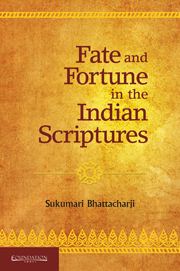Book contents
- Frontmatter
- Contents
- Preface
- Introduction
- Chapter 1 Inception
- Chapter 2 Rebirth and Transmigration
- Chapter 3 Karman and its Consequences
- Chapter 4 Karman, Fate and Free Will
- Chapter 5 Fate, Eschatology and Liberation
- Chapter 6 Premonitions and Presages
- Chapter 7 Deflection: Remedial Measures
- Chapter 8 Vicarious Deflection
- Chapter 9 Fate and Human Endeavour
- Bibliography
- Index
Chapter 6 - Premonitions and Presages
Published online by Cambridge University Press: 05 October 2014
- Frontmatter
- Contents
- Preface
- Introduction
- Chapter 1 Inception
- Chapter 2 Rebirth and Transmigration
- Chapter 3 Karman and its Consequences
- Chapter 4 Karman, Fate and Free Will
- Chapter 5 Fate, Eschatology and Liberation
- Chapter 6 Premonitions and Presages
- Chapter 7 Deflection: Remedial Measures
- Chapter 8 Vicarious Deflection
- Chapter 9 Fate and Human Endeavour
- Bibliography
- Index
Summary
BOETHIUSIN of the fifth century wrote his De Consolations Philosophiae in prison under a death sentence. He wrote a fictitious dialogue between himself and dame Philosophia. The philosophy taught him that “the transient affairs of our life stem from the stability of divine nature and its lasting simplicity. Providence is at the centre of all events. But when we seek to realize God's will in the changing scheme of things we are pushed to the concept of fate, for, fate it is which controls these. Fate allocates to every individual thing its special time and place.” God has an infallible foreknowledge of everything which frustrates man's freedom of action. Divine prescience is determined by eternity as an inherent quality. His philosophy consoles him in a manner which reconciles providence with fate. But ultimately this reconciliation is not achieved in theology or metaphysics. Yet man yearns for prescience about his future.
Fatalism stems from man's total ignorance and apprehension regarding what befalls him. Man would give much to ‘know’ his course of life in this and the subsequent ones. Since there is no solution to this, since the veil falls not only between the present and the future but also between the past and the present, man has at all times and in all climes sought for signs which would warn him and teach him to anticipate and prepare for what is coming. There are ways which man has invented to have foreknowledge of coming events. One of these is dreams. And their interpretation.
- Type
- Chapter
- Information
- Fate and Fortune in the Indian Scriptures , pp. 152 - 184Publisher: Foundation BooksPrint publication year: 2014

